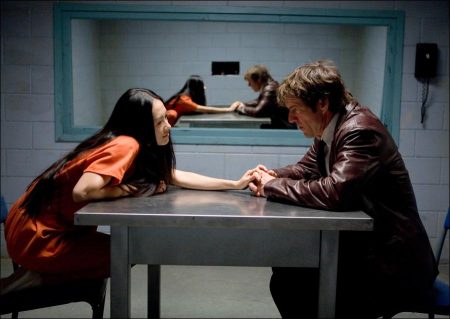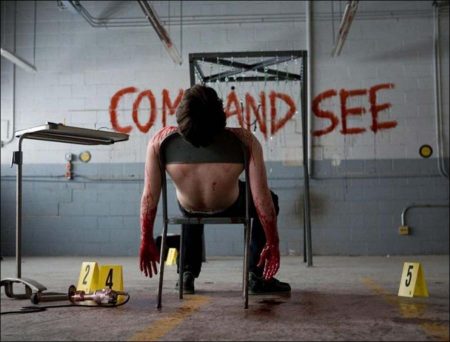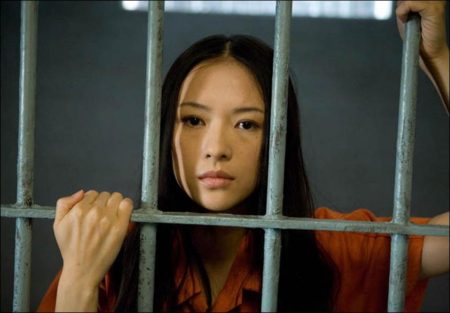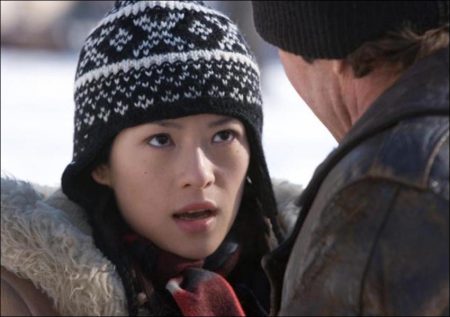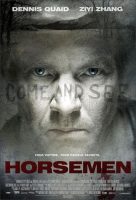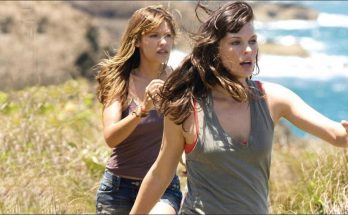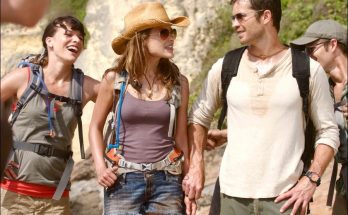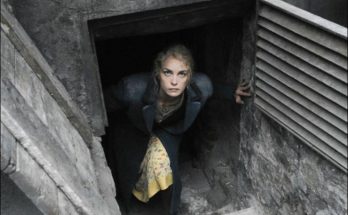Tagline: Four victims. Four painful secrets.
Horsemen tells the story of hardened detective Aidan Breslin, (Dennis Quaid) who, having grown increasingly distant from his two young sons since the death of his wife, now finds himself thrust into an investigation of perverse serial killings rooted in the Biblical prophecy of the Four Horsemen of the Apocalypse. As Breslin grapples with each new revelation in the case, he slowly discovers a shocking connection between himself and the four suspects. Four Horsemen. Four unrelated victims. Four painful secrets. Come and See.
At home, hardened police detective Aidan Breslin, (Dennis Quaid) has grown increasingly distant from his two young sons, Alex (Lou Taylor Pucci) and Sean (Liam James), since the death of his wife. At work, he finds himself thrust into an investigation of perverse serial killings rooted in the Biblical prophecy of the Four Horsemen of the Apocalypse: The White Horsemen, a master of deception and the unexpected leader hell-bent on conquest; The Red Horsemen, a sharp-witted warrior intent on turning man against man, with an innocence that hides a burning rage within; The Black Horsemen, a manipulative and dark tyrant, unbalanced but always one step ahead; and The Pale Horsemen, an executioner with disarming strength, determined to spread death through surgical precision.
Horsemen is a 2009 American psychological horror crime film directed by Jonas Åkerlund, written by David Callaham, and starring Dennis Quaid and Zhang Ziyi. It follows Aidan Breslin (Dennis Quaid) a bitter and emotionally-distracted detective who has grown apart from his two sons after the death of his devoted wife. While investigating a series of murders, he discovers a terrifying link between himself and the suspects that seem to be based on the Biblical prophecies concerning the Four Horsemen of the Apocalypse: War, Famine, Conquest and Death. The film was shot in Winnipeg and was released on March 6, 2009.
About the Production
In his 2002 directorial debut “Spun,” director Jonas Åkerlund took audiences to the gritty, grotesque, toxic and, at times, humorously absurd underworld of methamphetamine addiction – the amped addicts, the cookers and their hookers and The Man and his boys who kept the cycle spinning.
Now, in HORSEMEN, Åkerlund brings us to a very different world. This time it’s a place where seeming normalcy collides head-on with teeming abnormality as a modern day cop becomes transfixed on a series of brutal and bizarre killings rooted in the Biblical prophecy of the Four Horsemen of the Apocalypse. He is so gripped by the murders, he is losing his grip as a father and his two young sons are becoming victims of another kind altogether.
“The extremely varied elements of this story suited me very well,” says director Åkerlund. “It is a combination of a very suspenseful crime thriller with a very emotional family drama all set against a very haunting background of fervent yet terribly misguided religiousness. In fact, when I first met with the producers about directing the film, I actually referenced “Seven” and “Kramer vs. Kramer” and the documentary “Paradise Lost: The Child Murders at Robin Hood Hills.” That may sound a little weird but to me HORSMEN is directly related to those works thematically speaking.”
Radar Pictures and Mandate Pictures soon paired up with Michael Bay’s Platinum Dunes and put the project on the fast track.
“We all just loved this script at Platinum Dunes,” says Andrew Form. “For me, it was a real page-turner with a great twist and it was about stuff I really didn’t know anything about so I was completely enraptured with it. The characters and the images and the horrifying stuff that happens just stayed with me after I read it. It was a real unique find and I’m glad we’re the ones that found it.
“We all felt it needed to feel very real,” says Form, “and not be filled with a lot of gimmicks. It is a very dialogue-heavy movie and Jonas was terribly excited to be working with such a high level of dramatic content. He likes getting right in there with the actors so that affected his choices in camera work, locations, lighting…all of it. It’s very much all about the details and that’s they way we like to approach the work as well.”
“I’m big on storyboards,” says Åkerlund, explaining that the entire script was storyboarded before principal photography began, “and yes I’m very big on locations. I’m a big fan of the super-wide shot and the very intimate close-up. This film is filled with so many contrasts; from the panoramic desolate winter landscapes to the claustrophobic police interrogation rooms. I love being so close up that you can almost feel the texture of the character’s skin.
“My background is editing,” says Åkerlund, “so I always try to tell my stories through the edit rather than through the camera. I do a lot of coverage with my cameras so that I can set the tone and tempo in the edit. Over the years I’ve learned that there are lots of different techniques and approaches one can use to tell a story through film and this just happens to be what works best for me. I guess you could say that this is my ‘style’ and this script gave me so much opportunity to feel free in expressing my style of storytelling.”
“Jonas is a visual genius,” says actor Dennis Quaid. “He really knows how to tell a story in the images. He knows when to hold back and when to make the audience want to see more. He knows how to capture the details and gives you a very visceral experience visually.
“I also feel like the producers were really part of the partnership in making this film,” says Quaid. “We were all very collaborative in trying to tell the same story and I think it’s critical to be on the same page especially when making a movie like this one.”
“You know, this movie really became a reality once Dennis signed on,” says producer Fuller. “The character of Breslin is at the heart of this film and we needed an actor who could express an incredibly wide range of emotional content. That’s what’s so great about Dennis. He does everything well; drama, comedy, family films, action films. He literally stepped into this character and never stepped out until we wrapped.”
“Well, I have played cops before,” says Quaid, “and I’ve gotten to know a lot of cops over the years and they have their personal and professional issues like we all do. So Breslin is this guy who has lost his wife who he very dearly loved and now he’s a single dad trying to raise two young boys and hold on to his very intense job at the same time. That’s a tall order for anyone.
“His real battle is the schism that’s happening between him and his kids,” says Quaid, “and this series of killings is just compounding the difficulty of his situation at home. That growing disconnection is beating Breslin up pretty badly.”
With Quaid on board, the filmmakers could begin casting the ensemble of players which would surround him. Chinese actress Ziyi Zhang was the next actor who committed to this challenging piece of material. Zhang portrays Kristin, the troubled adopted teenager of an American family, whose patriarch is played by actor Peter Stormare. The challenges for Zhang, however, were magnified by the fact that this is her first film written and spoken entirely in English.
“To be honest, it was hard for me since English isn’t my native language,” says Zhang, laughing, “and there was so much intense dialogue. In fact, I don’t think I’ve ever had to deliver this much dialogue in any of my Chinese language films. HORSEMEN really tested me.
“It did offer me an opportunity to do powerful dramatic work which was irresistible,” says Zhang, who recalls having nightmares almost every night while she was shooting. “It’s an incredibly intense piece with very dark themes. Is Kristin evil or is she just a victim? Is she sane or insane? Is she repulsive or not? As an actor, it was highly satisfying to be given the freedom to create a character that is vastly different from who I am.”
“I know Ziyi went through blood, sweat and tears to not only learn the lines,” says Åkerlund, “but to learn to speak them as this incredibly emotional character would speak. Luckily, with all of her hard work, her talents as an actor and the great words and character written by Dave (screenwriter David Callaham), it all worked out quite well. We never felt limited by the fact that English was not her first language.”
The ensemble cast is rounded out by what producer Andrew Form calls “their company of players.” “We were lucky enough to get guys like Eric Balfour with whom Brad and I have worked before,” says Form, “and guys like Peter Stormare and Patrick Fugit who have previously worked with Jonas. That makes for a very comfortable, familiar and creative environment for everybody. I mean every single supporting role in this movie, from Paul Dooley to Lou Taylor Pucci, is a very talented and accomplished character actor, no matter what their age. I truly believe that it was the strength of the material that attracted all of them to tackle these characters with as much commitment and dedication as they did.”
For Pucci, who says HORSEMEN is his biggest movie to date, it wasn’t just the material that attracted him to the project. “Above and beyond the material it was Jonas and the producers who made this movie seem so cool to me,” he says. “They are just really cool, likable and really talented guys who made me feel so welcomed and comfortable.”
“We had always hoped that Lou would be interested in the role of Alex,” says producer Brad Fuller, who calls Pucci an actor with “Sundance credibility.” “Lou is so gifted as an actor and he completely embodies the spirit of what Alex goes through during the course of the story. It’s an absolutely amazing and riveting performance.”
Over the months, weeks and days leading up to a late January 2007 start of production, the filmmakers, cast and many of the crew of HORSEMEN ventured to Winnipeg from all over the world. The Swedish contingency included director Åkerlund, director of photography Eric Broms, costume designer B. and camera operator Viktor Davidson.
Producers Andrew Form and Brad Fuller, co-producers Jeremiah Samuels, Kelli Konop and Nicole Brown and many of the principal cast flew in from Los Angeles. First assistant director Phil Hardage flew north from Austin, Texas. Actor Dennis Quaid journeyed from his home in Montana and leading lady Ziyi Zhang came over from China. Many of the key crew were from Vancouver and Toronto. But was anyone, including the resident Winnipeg crew members, prepared for the extremely cold temperatures about to befall the production?
“Well, I would have to say that the Swedes and the Canadians were much more prepared, are much more used to it and can work extremely well in cold weather,” says Åkerlund, laughing. “I think the only people that were always complaining were the Californians and the Texans but that was understandable.
Principal photography began on January, 29, 2007 just as one of Winnipeg’s coldest spells of the season descended upon the city. On Day 1 the location was near Otterburne, Manitoba, about an hour south of Winnipeg. As the company prepared the day’s filming on a frozen pond, the high temperature (with the wind chill factor) would only reach a bone-numbing -35oC (or -31o F).
Most of the crew was unrecognizable as they were covered head-to-toe in Arctic outerwear and from the persistent parhelions (also known as “sun dogs”) in the sky, which some consider a weather predictor of sorts, it was not going to get any warmer any time soon. “There was only one word for the weather in Winnipeg,” says Ziyi Zhang. “Freezing! On the days we had to shoot outside, it was like working in a giant meat freezer. We had to wear layers and layers of clothes that had little heat pads in them to help keep us warm. The day Dennis and I filmed in the park, I am sure my face was frozen. I could hardly move my facial muscles to say my lines. When I cried in the scene, my tears froze instantly. Now that’s cold!”
HORSEMEN filmed in and around the Winnipeg area for eight weeks (long enough to eventually see and feel the early signs of spring) where it utilized some of the cities more historic locations such as the Bell Hotel, the Metropolitan Theatre and the beautiful neo-gothic Holy Trinity Church.
“I admit I was a bit skeptical at first of shooting in Winnipeg,” says Åkerlund. “When the production company asked me to go there to scout locations I was very negative and skeptical. They asked me to keep an open mind and give it a go which I did. I went there for three days and returned to Los Angeles thinking very positively about the locations .”
“The villain in this movie is neglect,” says producer Brad Fuller. “It is the catalyst by which every relationship – father and sons, mothers and daughters, killers and victims – is formed or affected in some way. As we all know, neglect can lead to very deep emotional feelings of grief, sorrow, guilt and even revenge. The serial killings of the Four Horsemen are a manifestation of feelings.”
“That’s what makes this piece so scary,” says producer Form. “It’s scary to think that just a little bit of neglect and lack of love could really push someone far enough to do some really unspeakable acts. I mean, read the headlines these days about the heinous crimes being committed by family members on other family members and school kids killing their teachers and classmates. As we delve deeper into these kinds of cases, we find there is usually some form of neglect whether it’s physical, emotional or social. There’s a great line in the script that says ‘There is no Four Horsemen. There are millions of them…’ It makes you wonder what’s out there just waiting to explode. It’s a concept that definitely grounds this movie in reality even if the Biblical references are alluding to the end of the world as we know it. It definitely makes you wonder.”
As theologians, psychologists and artists like Albrecht Dürer have done before them, the filmmakers interpreted the Biblical references of the Four Horsemen in their own way so as to tightly knit their characters to the storyline of the crime thriller.
“Black, red, pale green and white. The colors are all there,” says Fuller. “With Jonas’ visual style and the sublime production design of Sandy Cochrane, those colors are used to enhance the reasons and suspense surrounding each of the killings. Here again, we tried to take the Biblical references and use them not to hit our audience over the head with a message but rather to highlight the intricate details of the entire movie.”
There is a wholly different sort of suspense in HORSEMEN than the kind to which producer Fuller refers. As the serial killings are rooted in the ancient prophecy in Chapter Six of the Book of Revelations, the manner in which the victims are killed can be traced back to a ritual practiced by the extinct Native American Mandan tribe. It is called suspension and, in just the last few years, it has become a worldwide sub-culture.
“It was actually very easy to research the suspension world,” says director Åkerlund. “All I really did was to go on the Internet and I found hundreds if not thousands of different groups and people that do suspension. I have to admit in the beginning I was a little grossed out but being that it is an integral part of the movie I knew I had to find out more about it. After meeting and speaking with some people that practice this, I went and witnessed a suspension and that helped make me feel a bit more comfortable around it. These people spend a lot time preparing the rigs and themselves for each suspension. They’re very dedicated to it. So now I kind of understand it. For some it’s a pure and pleasurable adrenaline rush, for others it’s a way to face their fears, for some it’s a spiritual cleansing and for some it’s a type of performance art.
“No matter what the reason for doing it, it’s a very visual experience,” says Åkerlund. “Suspension is a very ‘in your face’ kind of thing to see with untrained eyes and I think it works tremendously well in the context of the movie. We all thought it was a very fresh approach to incorporate as part of a serial killer investigation. I think it will definitely strike a chord with the audience. Let me be clear though we’re certainly not endorsing people to go out and try this. It obviously can be very dangerous.”
Co-producer Jeremiah Samuels researched and found a man in Pasadena, California who agreed to let the filmmakers videotape a suspension demonstration.
“I was expecting to hear the voice of some incredibly insane sounding person on the other end of the phone,” says Samuels, laughing. “Instead I heard the voice of a guy who sounded like a dentist. He was terrific and incredibly informative so we asked him if he would let us videotape him and he agreed.
“So one Thursday afternoon, he and his lovely wife showed up,” says Samuels, “and he was a sweet, soft-spoken, humble man who just happened to enjoy this pursuit. He started explaining to us how much weight the ceiling would need to bear, he told us all about the hooks they use and the sterilization process and the disinfectants they use. Once the very precise preparations were complete, he did a demonstration which we videotaped for future reference.”
The videotape of the suspension demonstration became the key reference material for Los Angeles-based special effects house KNB and their supervising on set key SFX makeup artist Jake Garber. After studying the tape, the SFX team began devising ways to simulate the look of the hooks going through human flesh, the amount of blood that would be let and how to suspend the actors whether it was in the “Superman” pose or the more classic crucifixion pose.
“As is very common in the industry these days we used a lot of foam latex prosthetics,” explains Garber, who had previously worked with the Platinum Dunes producers on their films “The Texas Chainsaw Massacre,” “Amityville” and “The Hitcher.” “By manipulating the tension of the latex we re-created just the right amount of stretch that mirrored how human flesh reacts to these suspension hooks. It’s not unlike the process they used in the film ‘A Man Called Horse’ when Richard Harris was put through a purification ritual and has his pectorals pierced and was then suspended. Although the quality of latex and silicone products has advanced since then, the effect is still created with the same kind of rigs and practical prosthetics. It’s a fantastic effect that still holds up today even with all of the computer generated imagery that is available for enhancing special effects makeup.”
Garber admits it was rough on him to watch the taped suspension. “I personally had a tough time watching it,” he says, “but it was essential to getting it right and getting it real. The filmmakers never wanted the audience to think ‘oh skin wouldn’t stretch like that without ripping’ but we did our research and saw it with our own eyes and people would be surprised to know just how strong human skin is.
“I think the audience is in for some real scary and shocking stuff,” says Garber, smiling, “and I think a lot of them will be surfing the Internet after they see the movie to see if we got it right. I think they’ll be surprised how well we did what we did.”
Director Åkerlund agrees that the audience may not understand the complexities of the suspension sub-culture but he’s confident they will believe it within the context of HORSEMEN.
“These torturous killings happen because the killers are in an incredible amount of pain,” says Åkerlund. “They are feeling neglected, misunderstood and unloved. At some point in everyone’s life, they feel misunderstood or unaccepted by their family, friends or society in general. That’s why I think anyone who sees this movie whether they are the parent, the child, the friend or the priest will absolutely be able to relate to it on some level. That was my initial gut reaction after reading the script for the first time. I knew in my head and felt in my heart that the relationship between Breslin and his two kids was at the center of this story. Everyone is either a parent or a child and no one likes to feel pain. Those are very big emotional stakes and I’m hoping that people will see the film and take home the idea of spending a little more time on easing someone else’s pain.”
Horsemen (2009)
Directed by: Jonas Åkerlund
Starring: Dennis Quaid, Ziyi Zhang, Lou Taylor Pucci, Clifton Collins Jr, Barry Shabaka Henley, Neil McDonough, Peter Stormare, Thomas Mitchell, Chelcie Ross, Liam James, Manfred Maretzki, Arne MacPherson
Screenplay by: David Callaham
Production Design by: Sandy Cochrane
Cinematography by: Eric Broms
Film Editing by: Jim May, Todd E. Miller
Costume Design by: B. Åkerlund
Set Decoration by: Stephen Arndt
Art Direction by: Peter Emmink
Music by: Jan A.P. Kaczmarek
MPAA Rating: R for grisly and disturbing content, some sexual images and language.
Distributed by: Lionsgate Films
Release Date: March 6, 2009
Views: 82
